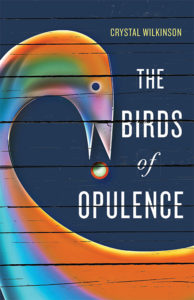 On March 28th 2017 the Loyal Jones Appalachian Center was honored to welcome Professor Crystal Wilkinson, author of the award-winning novel The Birds of Opulence. She shared intimate details about her family’s struggle with mental illness and her thoughts on how we need to change the way mental illness is addressed within Black communities and Appalachia. Hearing Crystal speak candidly on this topic allowed me to reflect on my own family’s experience with mental health. It brought to mind my mother’s struggles with raising five children, her feelings of inadequacy, and the bouts of depression they brought. Crystal’s words about the frustration, the not-knowing-what-to-do-ness, and the public’s general lack of understanding toward mental illness resonated with me.
On March 28th 2017 the Loyal Jones Appalachian Center was honored to welcome Professor Crystal Wilkinson, author of the award-winning novel The Birds of Opulence. She shared intimate details about her family’s struggle with mental illness and her thoughts on how we need to change the way mental illness is addressed within Black communities and Appalachia. Hearing Crystal speak candidly on this topic allowed me to reflect on my own family’s experience with mental health. It brought to mind my mother’s struggles with raising five children, her feelings of inadequacy, and the bouts of depression they brought. Crystal’s words about the frustration, the not-knowing-what-to-do-ness, and the public’s general lack of understanding toward mental illness resonated with me.
An audience member asked, “Do you have any advice for someone who has a loved one going through depression?” to which another audience member responded, “Three years ago, I was clinically depressed, my  husband didn’t know what to do, I didn’t know what to do. I still don’t know what advice to offer someone in that situation.” Professor Wilkinson said much the same herself, that she didn’t have specific advice. Mental illness is complex with multiple layers for everyone involved. But she did express the importance of asking the question, “What can I do? How can I help?” This is something that does not often happen in Appalachia, that those struggling are given power back and asked, “What would be best for you?” Instead, economically and socially, outside forces have prescribed fixes or solutions that repeatedly serve to benefit their own interests. Coal companies establish schools that teach pro-coal rhetoric. Doctors’ hand out Oxycodone like Halloween candy, pocketing kickbacks from pharmaceutical giants. I think mental illness has received much the same treatment in Appalachia, i.e. very little at all. People don’t talk about it or try to mask their troubles with religion, medication, and/or isolation. That is not to disparage any of those three. I believe the church can offer tremendous solace, medication is necessary at times, and isolation can give one peace and perspective. They are harmful though when used to out of fear, or to manipulate another’s actions. The better route may be to ask, “What do you need? How can I help?”
husband didn’t know what to do, I didn’t know what to do. I still don’t know what advice to offer someone in that situation.” Professor Wilkinson said much the same herself, that she didn’t have specific advice. Mental illness is complex with multiple layers for everyone involved. But she did express the importance of asking the question, “What can I do? How can I help?” This is something that does not often happen in Appalachia, that those struggling are given power back and asked, “What would be best for you?” Instead, economically and socially, outside forces have prescribed fixes or solutions that repeatedly serve to benefit their own interests. Coal companies establish schools that teach pro-coal rhetoric. Doctors’ hand out Oxycodone like Halloween candy, pocketing kickbacks from pharmaceutical giants. I think mental illness has received much the same treatment in Appalachia, i.e. very little at all. People don’t talk about it or try to mask their troubles with religion, medication, and/or isolation. That is not to disparage any of those three. I believe the church can offer tremendous solace, medication is necessary at times, and isolation can give one peace and perspective. They are harmful though when used to out of fear, or to manipulate another’s actions. The better route may be to ask, “What do you need? How can I help?”
In listening to Crystal and the audience, I came away with the sense that just being in this room, sharing with others who struggled and cared was a helpful step on the path to mental wellness and understanding. People were asking honest questions and coming from a place of compassion. Maybe it is less about “dealing” with mental illness or “solving it”, and more about building a supportive community, emotionally, spiritually, and mentally, around those struggling with this frightening enigma.
Article Written by Jordan Hutchins